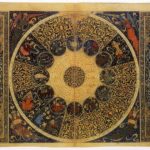
The fifth sūra ‘revealed’ in Makka is the Sūrat al-Fātiḥa (‘the opening sūra’) which runs: In the name of Allah, the Beneficent, the Merciful. Praise be to Allah, Lord of the Worlds, The Beneficent, the Merciful. Master of the Day of Judgment, Thee do we serve and Thee do we beseech for help. Show us the straight path, The path of those whom Thou hast favoured; Not the (path) of those who earn Thine anger nor of those who go astray.
FIRSTLY, THIS SŪRA IS NOT a Qur’ān sent down by the Lord of Heaven, but a thanksgiving and praise that Muḥammad addresses to the god who enabled him to install himself as king of the Arabs and their messenger. The fact that they say Amen at the end proves that it is a prayer that Muḥammad used to repeat and ask his Lord to accept, because Amen means ‘accept from us’.
After the basmala[i] the Sūrat al-Fātiḥa says, Praise be to Allah, Lord of the Worlds, The Beneficent, the Merciful. This phrase does not add anything to the basmala nor to the previous sūrahs because all the previous sūrahs begin with In the name of Allah, the Beneficent, the Merciful with the exception of Sūrat Al-Tawba. The fact that he changed ‘in the name of Allah’ to ‘praise be to Allah’ adds nothing new. It then says Master [mālik] of the Day of Judgment. People have differed in how to this verse; some of them said King [malik] of the Day of Judgment, and perhaps ‘king’ was closer to the truth because Muḥammad considered himself king of the Arabs, one who could command something or prohibit something, who could put others to death or spare them, and collect booty from his opponents. Being the ‘king’, or ‘master’, of the Day of Judgment does not mean anything, because a religion is not unique and religions have no specific day. If God had asked Muḥammad to voice this supplication, then He is a narcissistic god who loves only Himself, asks that people glorify him and supplicate Him in prayer seventeen times a day, and then asks them to stay up all night reciting the Qur’ān that begins with Sūrat al-Fātiḥa. It is as if people have no other task in life but to glorify this narcissistic god.
It is as if people have no other task in life but to glorify this narcissistic god
Thee do we serve and Thee do we beseech for help. This is the language of someone who thanks his Lord. If the speaker were God, He would say: Me do I serve and Me do I beseech for help. But because the speaker is Muḥammad he says to his Lord: Thee do we serve and Thee do we beseech for help.
Show us the straight path, The path of those whom Thou hast favoured. It is clear here that Muḥammad is asking his Lord to guide him to the straight path, for it would not be logical for God to say Show us the straight path. But as is the custom of the commentators, they maintain that the verse is to be preceded by the deleted word ‘say’, so the sūra now becomes: Say: Praise be to Allah, Lord of the Worlds. But why was the word ‘say’ omitted when the Qur’ān explicitly mentions this word in more than one hundred and thirty other verses including, for example, Say: I seek refuge in the Lord of mankind,[ii] and Say: I seek refuge in the Lord of the Daybreak[iii]? Who deleted it? Did God delete it without any logical reason? Or did Muḥammad delete it and thus alter God’s words?
The commentators differed as to the number of verses in this sūra, some of them saying that it was seven, because they made the initial basmala a verse of the sūra, even though they did not consider the basmala to constitute a verse in any of the rest of the sūras of the Qur’ān. Some of them considered it to be of only six verses. Those who made it seven gave it many names, including ‘the seven Mathānī’ because there is a verse that runs: We have given thee seven of the oft-repeated ones (i.e. verses) and the great Qur’ān.[iv] Because the commentators did not understand what was meant by ‘the seven Mathānī’, they claimed that it referred to the Sūrat al-Fātiḥa with seven verses. But the problem here is that the verses of Al-Fātiḥa are six, not seven. Moreover, the phrase ‘seven of the oft-repeated ones’ appears in Sūrat Al-Ḥijr, which is number 54 in order of ‘Revelation’, while Al-Fātiḥa was the fifth sūra in order. How does God betoken in the fifth sūra something He will only speak of in sūra 54?
We do not understand how a god in the sky who created this entire universe could be so angry at such weak creatures as mankind
Other commentators held that Sūrat al-Fātiḥa was called Al-Shifā’ (‘healing’) on the authority of the marfū‘ hadith[v] reported from al-Dārimī: ‘The Messenger of Allah said: “Al-Fātiḥa is a healing from every poison”. It is odd that Muḥammad should say this hadith, given that he died from eating a poisoned dish of mutton that a Jewess had given him on the day of the Battle of Khaybar. Did Muḥammad forget to recite Al-Fātiḥa so that his Lord would cure him of any poison? They said that its name was also ‘The Mother of the Book’ because it has attributes unique to it, so much so that it was said that the entire Qur’ān was contained in it. It has twenty-five words ‘that included all the knowledge that there is in the Qur’ān’ (Al-Qurṭubī, Tafsīr al-Fātiḥa). If this sūra contains all the knowledge that there is in the Qur’ān’, then there is no knowledge in the Qur’ān because the Sūrat al-Fātiḥa contains nothing but a supplication with which Muḥammad glorifies his Lord.
The commentators also differed even in the place where this sūra was revealed. Ibn Kathīr said the following:
It is Makkan, according to Ibn ‘Abbās and Qatāda. It is also said by Abū Hurayra, Mujāhid and ‘Atā’ to be Madīnan. Some say that it was revealed twice, once in Makka and once in Madina. Abū al-Layth al-Samarqandī narrated that half of it was reveeled in Makka and half of it in Madina.
If Al-Fātiḥa were a sūra that Allah ‘revealed’ to Muḥammad, people would not be in disagreement about the place of its revelation. But because it was a supplication that Muḥammad repeated, none of the companions could remember when it was revealed to him. If it had been revealed to him and the author of the Revelation had been asked to write it down accordingly, people would not have disagreed on the place of its revelation. Of course, there is no logical reason why Allah should reveal this short sūra twice, unless He knew that His Messenger and the rest of the Muslims were incapable of memorising these six verses. It is also inconceivable that He sent down half of it in Makka and waited more than ten years to send down the other three verses in Madina.
Did God delete “Say” without any logical reason? Or did Muḥammad delete it and thus alter God’s words?
And then there is the final verse in Sūrat al-Fātiḥa: Not the (path) of those who earn Thine anger nor of those who go astray. We can well understand that some people may stray from the straight path, but we do not understand how a god in the sky who created this entire universe with its galaxies, stars and planets could be so angry at such weak creatures as mankind. In fact, the angry person is Muḥammad and not God, and the reason Muḥammad was angry was that the Jews did not believe in him and he thus poured his anger over them. Since the Christians also did not believe him, the commentators maintained that the object of His anger are the Jews, and those who are lost are the Christians.
The result of all this is that Sūrat al-Fātiḥa proves that everything Muḥammad spoke in supplication or tahajjud (nightly prayer) such as Al-Fātiḥa and the two Mu’awwidha sūras (the ‘Verses of Refuge’) – Say: I seek refuge in the Lord of mankind and Say: I seek refuge in the Lord of the Daybreak – was considered by the Companions to be the Qur’ān. Muḥammad therefore forbade the companions to write down any hadith about him, and the jurists of Islam said that the reason for this prohibition was so that they would not confuse hadith with the Qur’ān. But the fact is that they are already mixed together.

Suggested Reading
Sūrat al-Masad
The sixth sūra that was ‘revealed’ in Makka is Sūrat al-Masad:
Perdition overtake both hands of Abu Lahab, and he will perish. His wealth and what he earns will not avail him. He will be plunged in flaming Fire, And his wife, the wood-carrier, Will have upon her neck a halter of palm-fibre.[vi]
Abū Lahab, as we know, was Muḥammad’s uncle, and he was convinced that Muḥammad was neither a messenger nor a prophet, and so he mocked him. The Lord of Heaven, the mighty one who caused the earth to swallow up Qārūn[vii] because he boasted to the children of Israel of his wealth, was angry with him. But he was unable to, or did not wish to, have the sands of Makka swallow up Abū Lahab, although it is much easier for sand to swallow up things than the solid land of Egypt, and so he resorted to curses: Perdition overtake both hands of Abu Lahab, and he will perish. His wealth and what he earns will not avail him just as Qārūn’s wealth did not avail him. This Abū Lahab was one of the nine uncles of Muḥammad who failed to believe in him; in which case why did the god of the Qur’ān pour his anger just on him and not mention his other uncles? The Qur’ān does not tell us why, but commentators say that Abū Lahab used to throw dirt on Muḥammad when he prostrated, and he would follow him in his meetings and tell people not to believe him.
Although this is a peaceful expression of opposition such as many people exercise – such as throwing eggs at politicians – the god of the Qur’ān did not like this manifestation of individual freedom and so he cursed Abū Lahab with fire: He will be plunged in flaming Fire – the same god who elsewhere states that he will not judge people by their deeds before the Day of Resurrection, the day when each of us will have our deeds recorded and weighed according to which side of the scales is the heavier:
Then as for him whose measure of good deeds is heavy, He shall live a pleasant life. And as for him whose measure of good deeds is light, His abode shall be the abyss.[viii]
But here we see Him hastening and not waiting for the scales and condemning Abū Lahab to eternal flaming fire. Was the God of the Qur’ān unable to provide his Messenger some argument that would convince Abū Lahab, or was He simply incapable of guiding Abū Lahab aright, the god that elsewhere said to Muḥammad: Surely you cannot guide whom you love, but Allah guides whom He pleases.[ix]
Why did He not focus his Qur’ān on guiding them, instead of preoccupying himself with cursing on one man and his wife?
If we accept that the god of the Qur’ān was overcome with wrath against Abū Lahab and issued his judgement in haste without waiting for the scales, then what is the guilt of his wife, the wood-carrier, that she should be plunged in flaming Fire? Commentators say she was throwing thorns in Muḥammad’s way. My! My! Throwing thorns in the way of the finest of God’s creatures earns a roasting in Hellfire forever? Would it not be natural justice that a punishment should fit the crime?
We might then wonder: Why did Allah denigrate this woman as a wood-carrier? There is a famous hadith that tells us that
It is better for anyone of you to take a rope and bring a bundle of wood on his back … than beg from people who may either give him something or not give him anything.[x]
Why did he describe Abū Lahab’s wife as a wood-carrier, when at the same time he said that her husband was rich but his wealth and what he earns will not avail him? Does the wife of a rich man carry firewood? What baffles me even more is that this poor woman, who will be plunged in flaming Fire, will have upon her neck a halter of palm-fibre, something that will last only a moment in the fire. Why did the god of heaven choose to put a halter of palm-fibre on her neck when he could have used iron shackles: And for them are hooked rods of iron?[xi]

Suggested Reading
In conclusion, Sūrat al-Masad did not add anything to our knowledge of Islam, nor to the knowledge of what God is, other than what we knew from the previous sūras, which is that He is a god who resorts to threats and intimidation every two or three verses. We may ask here: If this god was interested in millions of people and sent them a messenger to guide them to Him, why did He not focus his Qur’ān, especially its first sūras like these on guiding them, instead of preoccupying himself with cursing on one man and his wife?
[i] The basmala is the formula bismi ‘lLāh ‘in the name of Allah’. (Ed.)
[ii] Qur’ān CXIV (al-Nās), 1.
[iii] Qur’ān CXIII (al-Falaq), 1.
[iv] Qur’ān XV (al-Ḥijr), 87.
[v] A hadith which a Companion narrates directly from the Prophet. For the categories of hadith, see Glossary: ‘Hadith’.
[vi] Qur’ān CXI (al-Lahab), 1-5.
[vii] Qārūn was the cousin of Moses who was punished for becoming arrogant about his good fortune and superior wisdom, arguing that Allah had granted him these things due to his innate excellence. He appears in the Qur’ān at XXVIII (al-Qiṣaṣ), 76-81. (Ed.)
[viii] Qur’ān CI (al-Qāri‘a), 6-9.
[ix] Qur’ān XXVIII (al-Qiṣaṣ), 56.
[x] See, for example, Sunan Ibn Mājah 1836. (Ed.)
[xi] Qur’ān XXII (al-Ḥajj), 21.
